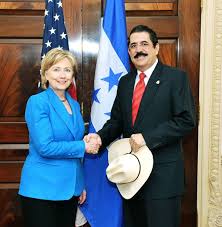She’s changed her mind on Iraq; what about Honduras and Libya?
This week presidential candidate Hillary Clinton told reporters that her vote in support of the Iraq war was a “mistake.” She explained, “I made it very clear that I made a mistake, plain and simple. And I have written about it in my book, I have talked about it in the past, what we now see is a very different and very dangerous situation.”

Clinton admits that she used the power of her office to make sure that Zelaya would not return to office.
Seven years ago, Clinton defended her vote during her 2008 campaign. Even after she acknowledged it wasn’t a good idea, for years she refused to call it a mistake.
Here are two more Hillary Clinton foreign policy moments she should be asked to reclarify.
1. Does she regret her involvement in Honduras’ 2009 coup? In her book, Hard Choices, Clinton admits her role in the aftermath of the military coup that unseated democratically elected President Manuel Zelaya. “In the subsequent days [after Zelaya was ousted] I spoke with my counterparts around the hemisphere, including Secretary [Patricia] Espinosa in Mexico,” writes Clinton. “We strategized on a plan to restore order in Honduras and ensure that free and fair elections could be held quickly and legitimately, which would render the question of Zelaya moot.”
What has happened in Honduras since 2009? In 2013, the Center for Economic and Policy Research concluded that, “In the two years after the coup, Honduras had the most rapid rise in inequality in Latin America and now stands as the country with the most unequal distribution of income in the region.” The homicide rate in Honduras, which was already the highest in the world, increased by 50% from 2008-2011, a shocking fact that fueled a significant portion of the recent child migrant crisis. Ninety-five percent of the murder cases in Honduras go unsolved. Honduras is currently the most dangerous place in the world to be an environmental activist, with at least 12 environmentalists murdered last year. Many women throughout the country live in fear of sexual violence; in 2014, 95% of sexual violence and femicide cases were never investigated. Last month, the Supreme Court of Honduras threw out a constitutional ban on the re-election of presidents. World Politics Review’s Dana Frank wrote that the decision was, “another step in the ongoing, methodical destruction of the rule of law and constitutional order in Honduras.”
2. Does she regret her role in the attack on Libya? There has been a predictable amount of focus on the subject of the Benghazi affair, but very little analysis of the wider issue of NATO’s Libya bombing. “We came, we saw, he died,” former Secretary of State Clinton joked with a TV reporter on the subject of Qaddafi’s death.
The reality of post-Qaddafi Libya is hardly a laughing matter. A New York Times report from March details some of the changes: “Nearly four years after the ouster of Col. Muammar el-Qaddafi, Libya’s warring cities and towns have become so entangled in internal conflicts over money and power that they have opened a door for the Islamic State to expand into the country’s oil-rich deserts and sprawling coastline. Libya has become a new frontier for the radical group as it comes under increasing pressure from American-led airstrikes on its original strongholds in Iraq and Syria.”
In addition to the presence of ISIS, the attack also led to abductions, torture and killings by local US-backed militias. According to Libya Body Count, over 3,500 Libyans have died violent deaths since January 2014. While many point to between 40-70 civilians killed in the bombing itself, a 2011 New York Times report identifies the problem with such numbers: “While that total is not high compared with other conflicts in which Western powers have relied heavily on air power, and less than the exaggerated accounts circulated by the Qaddafi government, it is also not a complete accounting. Survivors and doctors working for the anti-Qaddafi interim authorities point to dozens more civilians wounded in these and other strikes, and they referred reporters to other sites where civilian casualties were suspected.” Investigative reporter Nafeez Ahmed writes that NATO intentionally targeted Libya’s water supply, a war crime under the Geneva Conventions.
By: Michael Arria is the author of Medium Blue: The Politics of MSNBC. Follow @MichaelArria on Twitter
SOURCE: alternet.org and msnbc
You must be logged in to post a comment Login